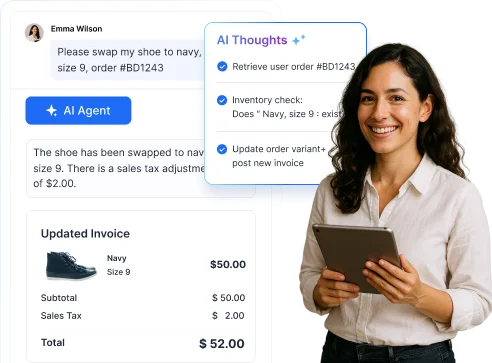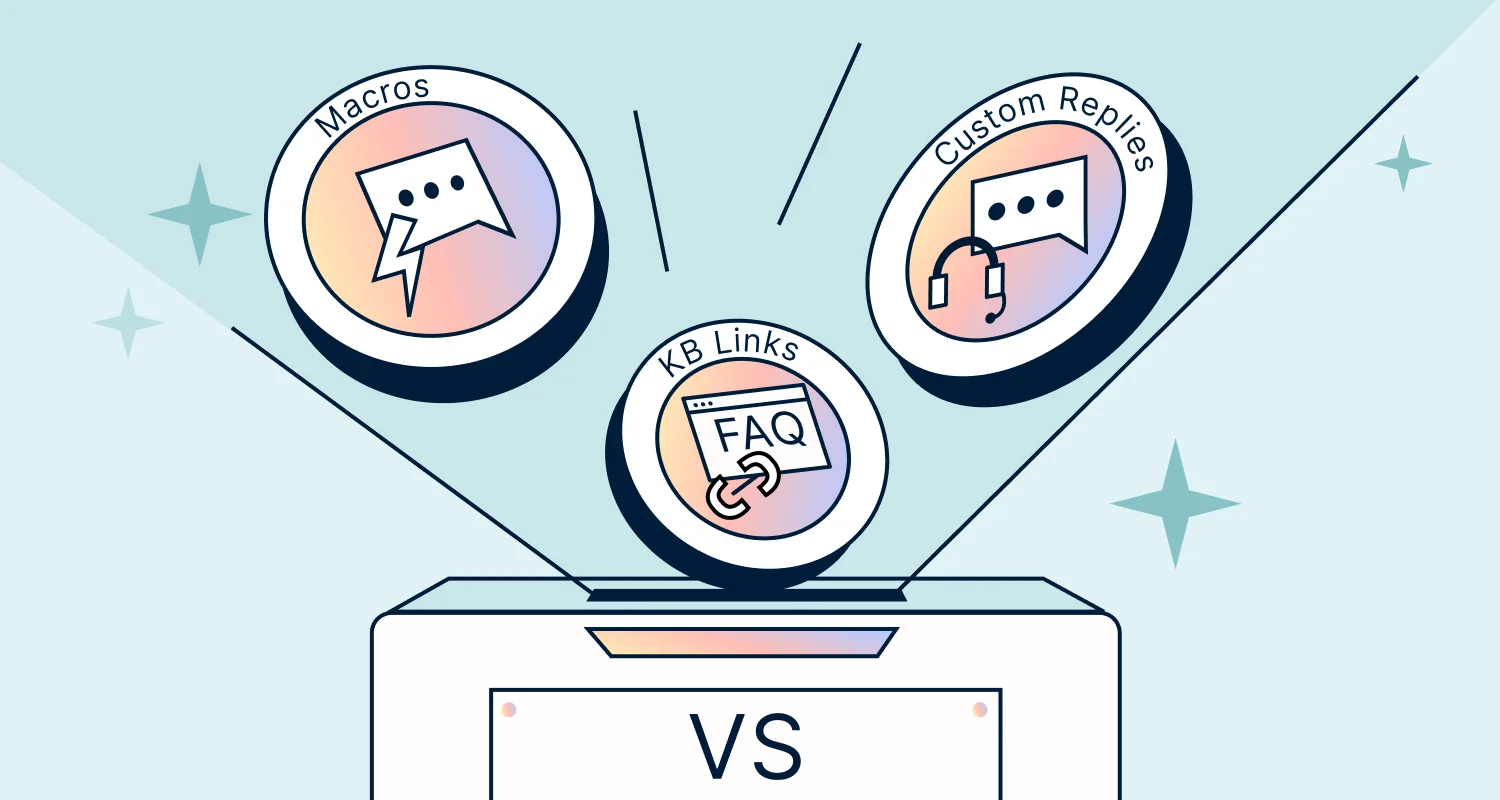When was the last time you messaged a brand on Facebook and got an instant response? It probably happened recently and felt seamless.
That’s because Facebook has quietly become a powerful customer support channel. With Facebook’s billions of users and built-in tools like Messenger, comments, and chatbots, it offers businesses more than just visibility.
Facebook for customer service enables real-time conversations, instant problem-solving, and stronger relationships. But not every brand gets it right.
While some deliver fast, personalized support that leaves a lasting impression, others keep customers waiting—or worse, never respond at all.
In this post, we’ll outline the benefits of Facebook for customer service, share actionable tips, and explore how top brands are using Facebook to deliver outstanding support.
Why use Facebook for customer service?
Facebook remains the most used platform with 87% of consumers using it to connect with brands (Sprout Social).
It’s no surprise that Facebook plays a key role in customer support. It’s simple, familiar, and already part of your customers’ daily routine, making it the perfect place to deliver fast, convenient support.
- Facebook engages a global audience where they already are: Facebook for customer service lets you connect with clients on a platform they use daily. Whether customers are browsing, commenting, or messaging, your brand can help in real time, making support seamless and natural.
- Helps brands attract and convert leads effortlessly: Facebook’s integrated ad and inquiry templates help you capture contact details from curious visitors and convert them into qualified leads, combining marketing with customer support.
- Enables faster resolution times: Facebook’s real-time messaging capabilities and seamless integrations enable support agents to respond to issues instantly, reducing wait times and improving customer satisfaction. Quick replies demonstrate your commitment to efficient, high-quality service.
- Provides valuable customer insights for continuous improvements: Facebook customer support serves as a valuable platform for gathering customer feedback through reviews and comments, helping businesses identify trends, fix recurring issues, and improve service offerings.
- Boosts your brand presence and trust online: Utilizing Facebook for customer service allows businesses to interact directly with their customers, enhancing your customer engagement strategies. Public responses to customer posts, helpful replies, and authentic conversations help build a positive brand image.
How to provide exceptional Facebook customer service
Delivering outstanding Facebook customer service goes beyond merely responding to messages. It’s about creating meaningful interactions that transform casual browsers into loyal brand advocates.
Let’s explore proven strategies to elevate your Facebook for customer support from adequate to outstanding.

Create a Facebook business page to support your customers
A dedicated Facebook business page is essential for leveraging the platform’s customer service capabilities. On it, you can post updates, respond to comments, and send direct messages to customers.
It provides access to tools designed specifically for businesses. These tools include:
-
- Messenger integration for real-time customer support
- Facebook insights to track engagement and performance metrics
- Custom tabs for easy customer navigation to important information
- Advertising tools and lead generation features to reach new customers with targeted ads
Pro tips:
- Update a profile image: Use a recognizable brand logo for engaging customers
- Add a page bio: Craft a short and appealing bio describing your business— can be company mission or vision, or objectives
- Promote the page: Implement a robust call-to-action (CTA) like “Message us” or “Get support” for customers to reach you via your Facebook account
Set up Facebook Messenger to offer real-time, personalized support
Facebook Messenger is a separate messaging app connected to Facebook that lets users send texts, images, videos, voice notes, and even make calls.
For businesses, Messenger acts as a powerful support tool, enabling real-time, one-on-one conversations. You can use it to answer questions, resolve issues, share updates, and even automate responses.
Pro tips:
- Provide instant replies: Set up automated greetings to acknowledge customer messages immediately
- Keep it friendly: Maintain a warm, conversational tone and sprinkle in emojis to humanize your responses
- Prioritize urgent messages: Use labels or tags to flag and escalate time-sensitive messages
Integrate Facebook with your ticketing system
To keep things running smoothly, integrate Facebook with your help desk software or ticketing software. This lets your team manage Facebook messages, comments, and posts all in a centralized platform.
By integrating Facebook with BoldDesk, you can streamline your support workflow by managing all Facebook inquiries directly within the help desk.
This eliminates the need to switch between platforms and ensures that customer communications from Facebook become part of your centralized ticket management system.

This integration also allows you to:
- Automatically convert Facebook comments into chat conversations when customers engage with your posts.
- Interact using rich media—text, images, videos, audio, and documents for more dynamic support.
- Set keyword filters to block spam or irrelevant comments from generating tickets, ensuring only relevant messages create conversations.
Leverage automation to handle inquiries at scale
Use automation in Facebook customer service to quickly handle common customer queries.
Tools like Messenger chatbots and Meta Business Suite allow you to send instant replies, answer FAQs, and guide customers 24/7, without overwhelming your team.
Pro tips:
- Use AI agents: Deploy bots to handle routine inquiries (e.g., order status, return policies) and escalate complex cases to human agents
- Ensure 24/7 support: Implement AI tools and a knowledge base to provide instant support even outside business hours
- Balance automation with live agents to ensure a human touch, personalized, and high-value customer experiences
Respond quickly to messages to build trust
Timely responses on Facebook are crucial, whether it’s a public comment or a private message.
In fact, a Khoros study found that 47% of customers on Facebook expect a reply within 3 hours after posting a complaint, whether in a public post or a private message.
Respond quickly to show customers you’re listening and that their concerns matter.
Pro tips:
- Assign dedicated agents: Have support team members focused solely on Facebook for customer service interactions, and route messages based on urgency
- Enable mobile support: Enable agents to respond on the go via mobile help desk
- Set clear SLAs: Aim for under 30-minute responses for messages and under 1 hour for public comments
Proactively observe customer interactions on Facebook
Observe customer interactions by regularly monitoring comments, messages, and posts where your brand is mentioned on Facebook—even if customers haven’t directly contacted you.
This allows your support team to identify potential issues, questions, and address customer complaints before they escalate.
Be the brand that reaches out first and stays ahead of the audience.
Pro tips:
- Use social listening tools to track mentions, keywords, and hashtags related to your brand across Facebook in real time
- Engage with feedback—positive or negative: Send thank-you notes to users for praise and address complaints with empathy and solutions. Public engagement shows other customers you’re attentive and reliable
- Monitor comments and tags: Keep an eye on comments on your posts and on posts where your business is tagged. Respond quickly to questions or concerns, even if they weren’t directed to support
- Set up alerts and notifications: Enable notifications for new messages and comments so your team never misses an interaction. Consider assigning a team member to monitor these channels daily
Train your support agents for social success
Providing outstanding customer service on Facebook requires well-trained agents who can navigate public interactions, resolve issues efficiently, and uphold your brand’s reputation.
Support agents need to be equipped with not only technical knowledge of the platform but also strong communication skills, emotional intelligence, and social media etiquette.
Pro tips:
- Familiarize agents with Facebook’s features: Ensure they understand Messenger, comments, posts, and Insights to help them navigate the platform confidently and deliver efficient support
- Practice real-life scenarios: Use role-play and simulations to prepare agents for handling tough situations like angry customers or viral complaints
- Teach effective soft skills: Train agents to communicate clearly and empathetically, focus on solution mindset, and conflict resolution
Track and monitor performance
Use Facebook insights to analyze metrics like response time, resolution rate, and customer satisfaction.
Collect this data to advocate for more resources, identify what’s working, and where improvements are needed in Facebook for customer service.
Pro tips:
- Use built-in Facebook Insights: Utilize Meta business suite or reporting and analytics tools to provide basic insights on response times, message volume, and customer engagement
- Analyze complaints: Monitor top complaint themes to pinpoint recurring issues and address the root causes
- Benchmark for quality: Set performance goals for metrics such as first resolution rate to evaluate team efficiency
Real-life examples of Facebook for customer support
Facebook has become a vital channel for customer service, enabling brands to interact directly with customers, resolve issues quickly, and build long-lasting relationships.
Below are three real-life examples that illustrate how companies are successfully leveraging Facebook to deliver outstanding customer support.
Hyundai- accelerating lead generation
Hyundai adopted Facebook Messenger to replace slower channels like email and phone. By using an automated Messenger tool, customers could ask questions and express interest in buying a car, receiving instant answers.
This approach led to more qualified leads, improved conversion rates, and lower acquisition costs.

KLM- leveraging Facebook Messenger for real-time travel support
KLM Royal Dutch Airlines has taken Messenger support to the skies—literally. They use Messenger to send flight updates, boarding passes, and rebooking options.
During delays, passengers receive automated notifications and can chat live with an agent. Their dedicated 24/7 support team handles travel inquiries directly through Messenger.

Starbucks- building trust through thoughtful engagement
Starbucks actively responds to customer complaints on Facebook with personalized, public messages. For example, if an order is wrong, they reply with a sincere apology and ask the customer to message privately for a resolution.
For example: “We’re so sorry your drink wasn’t perfect! Please DM us your store location—we’d love to make it right.”
This approach builds trust and shows their commitment to service and community engagement.

Enhance your customer experiences with Facebook for customer service
Your audience is already on Facebook. Isn’t it time your support team joined them? Facebook is an ideal platform to boost brand trust, credibility, and loyalty through real-time, meaningful engagement.
With BoldDesk’s integration with Facebook your support workflow is seamless and streamlined helping you respond faster, connect more personally, and deliver a standout experience.
Want to transform Facebook interactions into lasting customer relationships? Reach out to support team and see how BoldDesk® can elevate your customer support and propel your brand to great heights.
We hope this blog post provides valuable insights to help you level up your customer service strategy. Do you have any additional comments or feedback? Please share them in the comments section below.
Related articles
- How to Effectively Utilize Microsoft Teams for Customer Service
- ChatGPT for Customer Service: Benefits, Prompts, & Limitations
- Beyond Customer Support: Creative Ways to Utilize WhatsApp Integration with Your Ticketing System
FAQs on Facebook for customer service
You can handle negative comments effectively on Facebook for customer service by implementing these strategies:
- Respond professionally and promptly
- Express a genuine willingness to resolve the issue
- Offer an apology where appropriate
- Move the conversation to private messaging when necessary



















 Email Ticketing System
Email Ticketing System Shared Inbox Software
Shared Inbox Software Multi Brand Help Desk
Multi Brand Help Desk Internal Help Desk Software
Internal Help Desk Software Trouble Ticketing Software
Trouble Ticketing Software Mobile Help Desk
Mobile Help Desk 
















